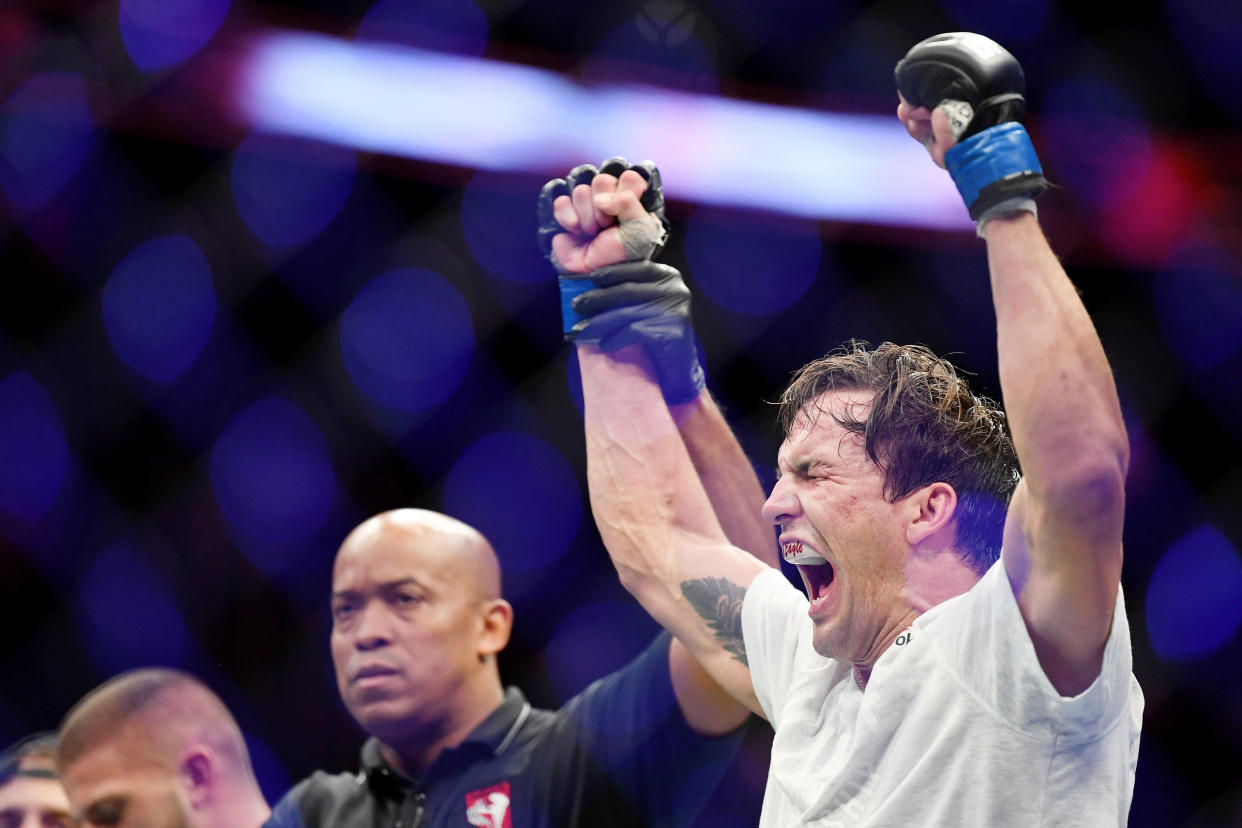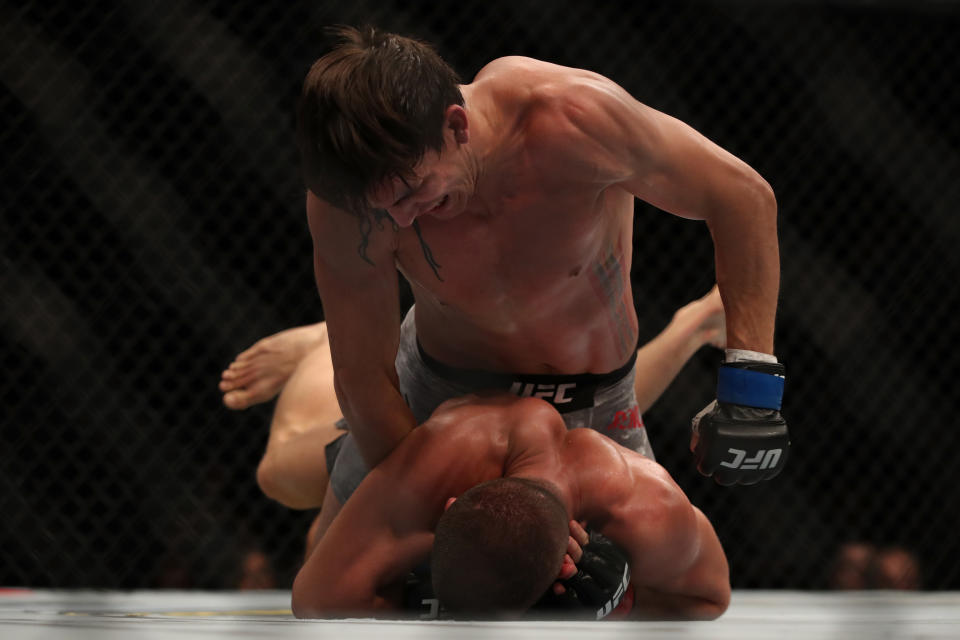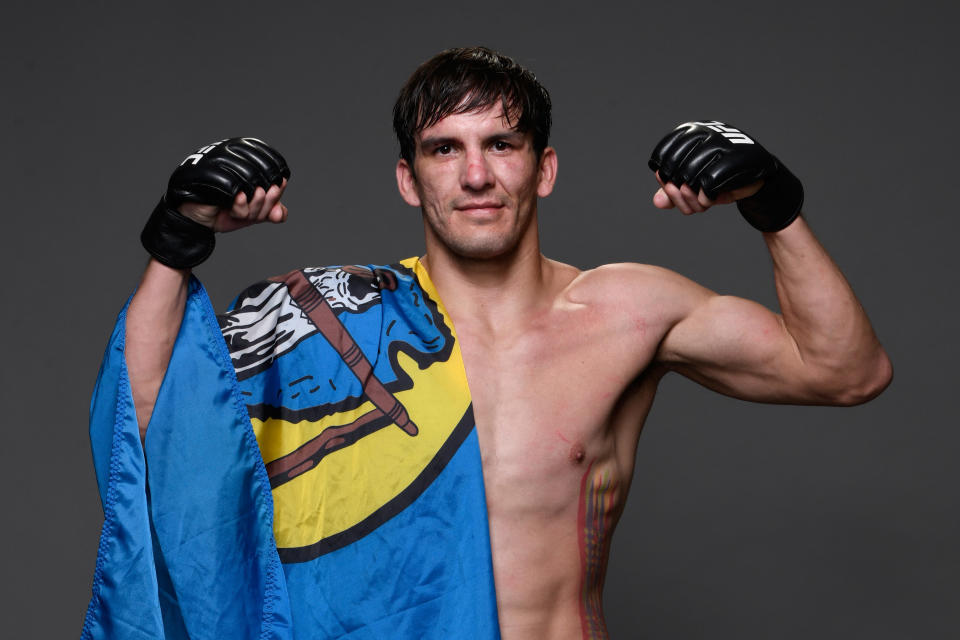UFC 244: Chance Rencountre on Native American pride and making ends meet

The last time I spoke with UFC welterweight Chance Rencountre he was excited for a July fight but disappointed that he’d miss out on an important cultural tradition because of training camp. The native Oklahoman and Osage Nation member has long been a dancer and his San Diego training camp took him away from I’n-Lon-Schka, a yearly Osage Ceremonial Dance.
He won his July 6 bout over Ismail Naurdiev, however, and as he looks ahead to his UFC 244 fight Saturday in New York City against Lyman Good, Rencountre says that his family helped him not feel guilty about missing the big ceremony.
“I talked to my sister and family of course and they kept me in the loop. They told me that the dances went well and that people were asking about me,” he recounts.
“Of course I was upset to have missed it and stayed out here [in San Diego] to train but my sister told me ‘the dances will always be there. Just concentrate on what you’re doing.’ I definitely missed it, though.”
For Osage like Rencountre, the I’n-Lon-Schka has special significance.
“It’s a great time with friends and family, a great gathering. It’s not like a normal pow-wow — we call it a ceremonial dance, and there are rules and regulations. Three different towns, all in Osage County, which used to be one giant reservation and then was turned into three small reservations, get together with drums and dancers. It’s a great time for all of us to get together. We eat great and it’s a great time to fellowship … it takes places from a Thursday to Sunday. Sunday is give away day and we have family songs, the same songs that have been sung for many generations. It’s a real humbling experience, and it means a lot. I don’t pow-wow anymore. I used to do it when I was younger. I’ll dance at a pow-wow if I’m asked, but this is definitely something I always went home for since I was 10 years old.”

The former collegiate wrestler and now rising UFC welterweight prospect is making headway with his MMA career, having won two-straight in the big league. Still, living and training in San Diego at the Alliance gym means he misses out on a lot with his family, including his daughter. The sacrifice isn’t easy, but he believes that it’s worth it.
“That’s been my battle for all this time,” he admits.
“And it truly is worth it. I get to go home and spend time with family and my daughter. ... I was able to take time off and go visit her for a weekend to watch her cheer about a month ago. I wouldn’t have had that opportunity if I were not doing what I’m doing. I’m doing this to make a difference in my life and my family’s life. It’s humbling to get home and get to hang out with her.”
Rencountre is indeed making progress when it comes to making ends meet as an MMA fighter. Fight fans may be surprised to learn that of fighters in the UFC, which boasts major corporate sponsorship.
Still, UFC athletes – as opposed to MLB, NFL and NBA athletes – do not have their own union or associations, and they subsequently don’t enjoy employment status, salaries, year-round health insurance, pensions, or any number of other life-stabilizing necessities. As a result, many UFC fighters must have second and third jobs, much like American athletes in other sports did 50 or more years ago, despite being called “professional athletes.”

For the first time in his impressive MMA career, Rencountre has not had to hold down another job outside of fighting during this most recent training camp. As he’s been able to put together consecutive wins, Rencountre says that his fortunes have improved.
“Yes, one hundred percent,” he says.
“This was the first camp for a fight where I have not had to work outside of training for the fight. ... This is the first fight where I’m comfortable enough financially to train full-time. There’s never enough money in the world but at least I can survive. I can pay bills and take care of my daughter back home and commit fully to fighting. Hopefully my performance shows the difference.
“It is truly humbling. I train every day with other fighters who still have to go to work. I can finally not have to worry about that. It’s not the hardship, it’s the stress, the mental drain, that adds up over time. Not getting enough rest, being on your feet extra hours, not being able to rest fully and concentrate on your fight. Now, if I want to schedule a workout at a certain time I don’t have to schedule around a job. I have time to myself. I didn’t have to ask permission to go home at a certain time to see my daughter. I get to worry about me, take care of me, and let my well-being be the No. 1 priority. It’s amazing.”
Blazing a path for himself and then showing others from the Native American community from which he came that life is full of possibilities is why Rencountre flies the Osage Nation flag. “I want people to know it’s not a gimmick,” he implores.
“It’s not to get popularity in the Native community. It’s about pride for me. I come from a small reservation, I dance the dance, I lived in the community. For me to come from a small community and what I do, I have to let them know I’m proud.
“I want to let everybody else know there are Osage athletes, there are Native American athletes. I want Native American youth to see that you can come from the Rez and dream and work hard. That’s what I did. I didn’t have anything given to me. I had to work hard. I know that’s a lot of people’s stories, but that’s why I take the flag with me — to be proud and show Native American youth that they can dream and work hard and that they don’t have to be content with life as it is. I was never that kid. I always wanted to do something big, and I didn’t know what it was, but now it’s happened.”
More from Yahoo Sports:

